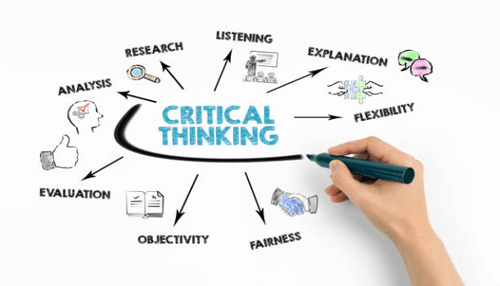Introduction
Critical thinking is the process of systematically processing information for better decision-making. Critical thinking skills are an important skill to possess in the workplace. It lets you analyze the facts more objectively and make informed business decisions.
Critical thinking is generally free from biases and based on data and facts. Possessing at least 5 critical thinking skills can make you successful at work. The ways to enhance critical thinking skills at work are discussed below:
Ask Basic Questions
One of the most basic elements of critical thinking is asking basic questions. Most of us believe that great thinkers ask complex questions. However, most successful critical thinkers ask basic questions. They understand the problem at hand better and can ask fundamental questions that are clear.
Asking what you know, how you know it, what your goal is, whether you are overlooking important facts, etc. will help. Such questions help to get into the crux of the problem. You can find better and more creative solutions by asking these basic questions.
Understand Your Critical Thinking Process
Critical thinking evolves with time. You should understand your thinking process and how your mind works to develop your critical thinking. Everyone’s thinking process is unique, and they can come up with different solutions to the same problem. Sometimes, you may miss important facts while analyzing information. Our brains use heuristics—cognitive shortcuts to make quick inferences.
In some cases, these heuristics can overlook important facts and give you unreliable results. You should also understand your cognitive biases. You must know about these prejudices and how they affect the solutions and decisions that you make. Understanding and controlling your thinking process can improve your critical thinking skills at work considerably.
Be a Better Listener
Active listening is a fundamental quality of critical thinking. Unfortunately, the art of attentive listening is fading. Most people do not listen attentively or listen only to respond and not to understand. You should listen carefully and attentively to what is being said by your colleagues, subordinates, and seniors.
This may provide you with a fresh perspective and ideas that can help solve complex problems. You can also have productive conversations with them to come up with better ideas and solutions. Being an attentive listener is one of the five critical thinking skills that you must possess to be successful.
Develop Foresight
Good foresight is an asset. It can help you make decisions that transform your business. Developing good foresight does not happen overnight. You need to work on it and you get better with experience. One way to develop foresight is to analyze every business decision by listing its pros and cons.
It will help you understand the choices available and the outcomes expected from each of them. You must determine the possible outcomes of a choice and the positive or negative changes it may bring. You will also get better at predicting outcomes with this exercise.
Analyze Existing Evidence
When you go about solving problems in the workplace, refer to the existing evidence. There would have been attempts made in the past to solve such problems. You may not need to reinvent the wheel and use the learnings from previous attempts to propose a solution. However, be mindful that such an analysis needs to be intensive and pervasive.
You can arrive at the wrong conclusions and decisions if you do not do so. Questions like who gathered the evidence, how it was gathered, why it was gathered, etc. need to be asked. You should not be in a hurry and jump to conclusions without completing your analysis of the existing evidence. Being analytical about existing evidence is one of the top 5 critical thinking skills.



